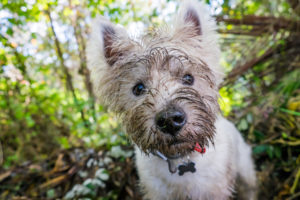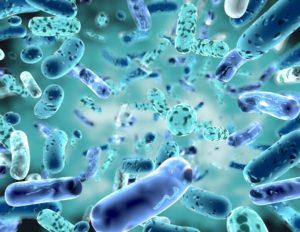Holistic Pet Care: Your pet is an integral part of the family, so, like any loved one, you want your pet to thrive. Yet, those who focus on health and wellness forget that many of the same lifestyle concepts we apply to our lives are also important for our furry friends.

This article has been medically reviewed by Dr. Charles Penick, MD
Just as whole-person wellness considers all the critical pieces of health, holistic pet care considers the needs of animals so they can thrive during their lifetime. If they are as important as any other family member, we should treat them as such.
Here are five critical pieces of holistic pet care so you can help your pet live a long, healthy, happy life. It’s not a surprise that all of these are also important foundational health habits for humans too.
Oral Health

Just as we learn the importance of brushing our teeth from a young age, keeping oral care a priority for your animals is equally important. At a basic level, poor oral health makes it difficult for dogs and cats to chew their food and eat a healthy diet.
But oral health is also essential for holistic pet care. The oral microbiome (or the healthy bacteria in the mouth) protects from inflammation. Diet (as you will learn below) and regular teeth brushing can keep teeth and gums healthy while supporting a healthy balance of bacteria in the mouth. There are also specialty products you can give your pets to chew that help to support teeth and gum health.
Raw Diet

We know that nutrition is vital to a healthy lifestyle, so don’t ignore the importance for your pets. Many commercially made dog foods are filled with refined grains, sugars, oils, chemicals, and fillers, which can have the same inflammation-producing effect in humans.
While there are better shelf-stable choices available, many still contain not-so-healthy ingredients. If you follow my work, I believe we should eat in a way that matches our natural evolutionary patterns. The same goes for our pets. While animals have clearly evolved from wild lifestyles to home companions, we can still consider their ancestral design when providing their food.
A raw diet requires care, so make sure to introduce only healthy, safe meat to your animal’s diet. But when done correctly, it provides bioavailable vitamins and minerals without harmful additives. You can even give your pets the same fermented foods you feed yourself. It supports a healthy microbiome (more on this below) by introducing beneficial microbes and fiber to support a healthy digestive tract, giving your animal the energy and immune support it deserves.
Exposure to dirt and the outdoor environment.

Again, just as we should encourage everyone at all ages to get outside and get dirty, the same goes for our pets. Playing in the dirt exposes humans and pets to healthy microbes that strengthen the immune system and the microbiome. A lack of exposure to these beneficial organisms may explain the rise of allergies and sensitivities, as an unexposed immune system is more likely to overreact when exposed to potential pathogens down the road.
Take your pet on a walk, to the dog park, or on a hike whenever possible. Let him nose around in the dirt and sniff other dogs. This can even benefit you and your family. People with pets tend to have fewer allergies due to exposure, and you even share skin microbiota with your dog.
Movement

Animals were meant to move, explore, to prowl. It helps with anxiety and mental health to keep them calm while supporting a healthy weight (sound familiar to human health?). Overweight animals are more likely to suffer from arthritis and joint issues as they age, and extra weight increases their risk for chronic diseases like diabetes and cancer.
You can combine exposure to dirt and the outdoor environment with movement. As a bonus, you will move too! Studies show that people with pets, especially dogs, tend to be more physically active.
Holistic Pet Care: Microbiome support

As mentioned above, an animal’s gut microbiome is as important as it is to human health. A healthy microbiome is essential for wellness – from immune health, healthy skin and fur, the ability to digest and absorb nutrients, and fighting back against inflammation and chronic disease.
Diversity and balance are crucial to gut health – or the right types of bacteria in the proper ratios. An unhealthy balance of the wrong kinds of bacteria or low diversity can lead to irritable bowel disease, chronic digestive or skin issues, and more. Oral health supports the mouth bacteria. Getting outside in the dirt helps expose our pets to beneficial bacteria. A proper diet supports a healthy gut microbiome. However, just as humans take probiotics for additional support, pet probiotics can be a bonus tool to boost the microbiota’s diversity and balance.
Spore-based probiotics are incredibly supportive for gut health.
FidoSpore is a supplement created specifically to support the microbiome of dogs. The strains included in this product produce digestive enzymes and short-chain fatty acids – both essential for strengthening the gut barrier and decreasing inflammation. It can also help dogs with sensitive stomachs who experience constipation and diarrhea, creating a healthy balance of beneficial bacteria while reducing potential pathogenic species.
Overall Pet Gut Health
Chances are, no matter how much you love your pet, they’re not eating the same high-quality food or drinking the same filtered water you are…Over time, exposure to toxic fillers, preservatives, artificial colors, and sugar (yes, there’s sugar in pet food!) will start to take a toll on their health.
Especially their gut health.
ION*Gut Health is a gut-strengthening, brain-boosting mineral supplement sourced from 60-million-year-old soil that naturally supports microbiome balance.
The active ingredient, Terrahydrite®, has been shown to support the integrity of tight junctions in the gut lining, even in the face of damaging toxins like glyphosate.
And yes, it works for cats and dogs.
Starting with just 3-5 drops of ION Gut Health per day, you can transform your pet’s gut health to help battle allergies and skin issues and help ensure a longer, happier life.
>> Get ION*Gut Health for you AND your pet!
If holistic wellness is important to you, ensure you extend the same care to your pets. With the right diet and lifestyle changes, your pet will be by your side for many years of memories.
Medical Disclaimer: This article is based on the opinions of The Cell Health team. The information on this website is not intended to replace a one-on-one relationship with a qualified healthcare professional and is not intended as medical advice. It is intended to share knowledge and information from the research and experience of the Cell Health team. This article has been medically reviewed by Dr. Charles Penick, MD, for the accuracy of the information provided. Still, we encourage you to make your own healthcare decisions based on your research and in partnership with a qualified healthcare professional.
References:
- Bellows, Jan, Mary L. Berg, Sonnya Dennis, Ralph Harvey, Heidi B. Lobprise, Christopher J. Snyder, Amy E. S. Stone, and Andrea G. Van de Wetering. “2019 AAHA Dental Care Guidelines for Dogs and Cats.” Journal of the American Animal Hospital Association 55, no. 2 (April 2019): 49–69. https://doi.org/10.5326/JAAHA-MS-6933.
- Davis, Eric M. “Gene Sequence Analyses of the Healthy Oral Microbiome in Humans and Companion Animals: A Comparative Review.” Journal of Veterinary Dentistry 33, no. 2 (June 1, 2016): 97–107. https://doi.org/10.1177/0898756416657239.
- Buff, P. R., R. A. Carter, J. E. Bauer, and J. H. Kersey. “Natural Pet Food: A Review of Natural Diets and Their Impact on Canine and Feline Physiology.” Journal of Animal Science 92, no. 9 (September 1, 2014): 3781–91. https://doi.org/10.2527/jas.2014-7789.
- Park, Da Hye, Damini Kothari, Kai-Min Niu, Sung Gu Han, Jee Eun Yoon, Hong-Gu Lee, and Soo-Ki Kim. “Effect of Fermented Medicinal Plants as Dietary Additives on Food Preference and Fecal Microbial Quality in Dogs.” Animals : An Open Access Journal from MDPI 9, no. 9 (September 16, 2019). https://doi.org/10.3390/ani9090690.
- Di Cerbo, Alessandro, Julio Cesar Morales-Medina, Beniamino Palmieri, Federica Pezzuto, Raffaella Cocco, Gonzalo Flores, and Tommaso Iannitti. “Functional Foods in Pet Nutrition: Focus on Dogs and Cats.” Research in Veterinary Science 112 (June 1, 2017): 161–66. https://doi.org/10.1016/j.rvsc.2017.03.020.
- Blum, Winfried E.H., Sophie Zechmeister-Boltenstern, and Katharina M. Keiblinger. “Does Soil Contribute to the Human Gut Microbiome?” Microorganisms 7, no. 9 (August 23, 2019). https://doi.org/10.3390/microorganisms7090287.
- “Newborns Exposed to Dirt, Dander and Germs May Have Lower Allergy and Asthma Risk – 06/06/2014.” Accessed February 23, 2021. https://www.hopkinsmedicine.org/news/media/releases/newborns_exposed_to_dirt_dander_and_germs_may_have_lower_allergy_and_asthma_risk.
- Song, Se Jin, Christian Lauber, Elizabeth K Costello, Catherine A Lozupone, Gregory Humphrey, Donna Berg-Lyons, J Gregory Caporaso, et al. “Cohabiting Family Members Share Microbiota with One Another and with Their Dogs.” Edited by Detlef Weigel. ELife 2 (April 16, 2013): e00458. https://doi.org/10.7554/eLife.00458.
- “Obesity in Dogs | VCA Animal Hospital.” Accessed February 23, 2021. https://vcahospitals.com/know-your-pet/obesity-in-dogs.
- Cutt, Hayley, Billie Giles-Corti, Matthew Knuiman, Anna Timperio, and Fiona Bull. “Understanding Dog Owners’ Increased Levels of Physical Activity: Results From RESIDE.” American Journal of Public Health 98, no. 1 (January 2008): 66–69. https://doi.org/10.2105/AJPH.2006.103499.
- “The Gut Microbiome in Health and in Disease : Current Opinion in Gastroenterology.” Accessed February 23, 2021. https://journals.lww.com/co-gastroenterology/Abstract/2015/01000/The_gut_microbiome_in_health_and_in_disease.12.aspx.
- Suchodolski, Jan S. “Intestinal Microbiota of Dogs and Cats: A Bigger World than We Thought.” The Veterinary Clinics of North America. Small Animal Practice 41, no. 2 (March 2011): 261–72. https://doi.org/10.1016/j.cvsm.2010.12.006.
- Mondo, Elisabetta, Giovanna Marliani, Pier Attilio Accorsi, Massimo Cocchi, and Alberto Di Leone. “Role of Gut Microbiota in Dog and Cat’s Health and Diseases.” Open Veterinary Journal 9, no. 3 (October 2019): 253–58. https://doi.org/10.4314/ovj.v9i3.10.
- Hooda, Seema, Brittany M. Vester Boler, Katherine R. Kerr, Scot E. Dowd, and Kelly S. Swanson. “The Gut Microbiome of Kittens Is Affected by Dietary Protein:Carbohydrate Ratio and Associated with Blood Metabolite and Hormone Concentrations.” The British Journal of Nutrition 109, no. 9 (May 2013): 1637–46. https://doi.org/10.1017/S0007114512003479.
- Kates, Ashley E., Omar Jarrett, Joseph H. Skarlupka, Ajay Sethi, Megan Duster, Lauren Watson, Garret Suen, Keith Poulsen, and Nasia Safdar. “Household Pet Ownership and the Microbial Diversity of the Human Gut Microbiota.” Frontiers in Cellular and Infection Microbiology 10 (2020). https://doi.org/10.3389/fcimb.2020.00073.


